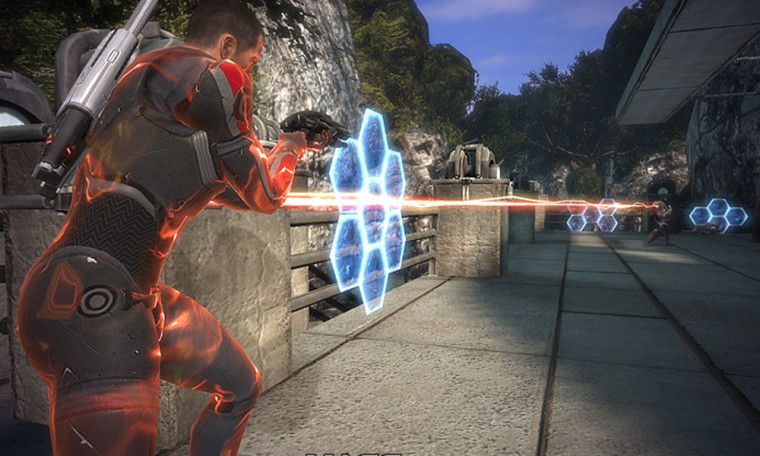Video games are undergoing a real renaissance in storytelling this holiday, from Sony's "Uncharted" to Ubisoft's "Assassin's Creed." But the undisputed champ of 2007 is "Mass Effect," a sprawling space opera for the Xbox 360. Boiling over with new twists on science fiction staples, political intrigue on a galactic scale, and even a handful of romantic subplots, "Mass Effect" delivers a narrative that you can really sink your thumbs into over and over again.
The backstory sounds like typical sci-fi fodder: Humankind is a relative newcomer to the overall galactic community, but our propensity for aggression and compassion has made us a huge focal point of the known universe. In fact, so much attention is lavished on humans that other alien races view us with jealousy and disdain.
Because humankind has only recently joined the cosmic rat race, we still do not have a place on the council that oversees all activity in the galaxy — nor are we represented amongst the Spectres, agents of the council that are not bound by traditional law.
One of those Spectres, Saren, has gone rogue and attacked a human colony to get his hands on an ancient alien artifact that could unlock the deepest secrets of the universe. Humankind must take matters into their own hands to track down Saren and bring him to justice. That is, if the council will even listen to evidence brought forth by the game's hero: Commander Shepherd.
How you get from one end of the galaxy to the other and apprehend Saren is entirely up to you — and this is one of the rare times when a video game that promises a "do-anything" universe actually delivers. "Mass Effect" is a game about choice. From the moment you start the adventure, you are bombarded with decisions that have significant effects on how the game unfolds.
Perhaps your biggest decision is how you choose to construct the game's hero, Shepherd. Making the hero a heroine will dictate how some aliens treat you. You can also customize Shepherd's background, which in turn affects the storyline. Before finally heading out into the coldness of space, you choose whether to make Shepherd a soldier, technician, or biotic (biotics are the game's equivalent of magic) — or some combination of the three.
The choices hardly stop there. Between action scenes, Shepherd enters into a lot of conversation — if it has ears and a mouth, it's fair game for a chat. A lesser game would be slighted for being too "talky," but the crackling banter and smoothly doled-out exposition never grows tiresome. (Exceptional voice work also helps, including a star turn from actor Keith David, the Arbiter in "Halo 2" and "Halo 3.")
While engaging in dialogue, you choose Shepherd's thrusts and parries, guiding the conversation. Shepherd can represent the best in humankind's generosity or dish out some harsh words that get the job done, hurt feelings be damned. A silver tongue can even lead to a little romance, allowing Shepherd to go all Captain Kirk with blue-skinned alien women. This is a true role-playing game.
"Mass Effect" is hardly just a tea-time simulator. The Spectre has struck a bargain with a ghastly race of aliens called the Geth, and the majority of combat situations involve Shepherd blasting Geth nasties off hostile planets. The combat is seen in third-person, not entirely unlike the Xbox 360 hit, "Gears of War," and for the most part, it's consistently thrilling. The ramification of past choices is really felt in combat, as you wonder if beefing up your talents with a shotgun was unwise in a situation where defensive biotic powers might have been more useful.
Exploration is also a major component of "Mass Effect." The central hub of the galaxy and home of the galactic council, called the Citadel, is a colossal space station full of sights, sounds, and curious aliens. Players can pick up a lot of extra jobs here to augment the main quest, another cool part of "Mass Effect's" choose-your-own-adventure vibe.
Nothing's perfect, though, and "Mass Effect" is marred by a list of unfortunate technical glitches and presentation-related speed bumps. The otherwise strong visuals often need a second or two to catch up to the hero as he runs from location to location. The frame rate occasionally struggles to keep up, reducing the game to a slideshow for several seconds at a time. Your squad members also have a talent for getting stuck in doors and crates at just the wrong time, like in the middle of an intense firefight. None of these problems are absolute showstoppers, the kind of bugaboos that make you want to permanently eject the disc.
"Mass Effect" is also sorely lacking any guidance for the player. It will likely take players a few hours to figure out the game's unnecessarily complex menus. The manual that ships with the game isn't much of a help (this game cries out for an interactive tutorial). Your second play-through will be much smoother than the first, and likely more rewarding.
That’s OK though: This game truly warrants multiple plays so that you can witness all the good stuff, both big and small, that Bioware has packed in for the curious gamer. And as games settle into a $60 price point, value like this cannot be underestimated.
